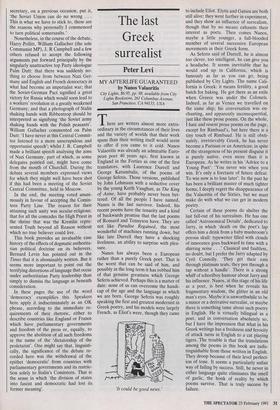The last Greek surrealist
Peter Levi
MY AFTERLIFE GUARANTEED by Nanos Valaoritis
City Lights, $6.95, pp. 88, available from City Lights Bookstore, 261 Columbus Avenue, San Francisco, CA 94133, USA
There are writers almost more extra- ordinary in the circumstances of their lives and the variety of worlds that their work spans than their writing itself would seem to offer if you came to it cold. Nanos Valaoritis was already an admirable Euro- pean poet 40 years ago, first known in England in the Forties as one of the first translators, with Laurence Durrell and George Katsimbalis, of the poems of George Seferis. Those versions, published by John Lehmann with a seductive cover by the young Keith Vaughan, as The King of Asine, have probably never been bet- tered. Of all the people I have named, Nanos is the last survivor. Indeed, his recent poems have the tenacity and a kind of backwards promise that the last poems of Ronsard and Tennyson have. They are not like Paradise Regained, the most wonderful of machines running down, but like late Durrell they have a shocking liveliness, an ability to surprise with plea- sure.
Nanos has always been a European rather than a purely Greek poet. That is the worst that can be said of him, and possibly in the long term it has robbed him of that genuine greatness which George Seferis achieved. Perhaps this is a matter of date: none of us can overcome the handi- cap of the age and the language in which we are born. George Seferis was roughly speaking the first and greatest modernist in Greek poetry, and his models were largely French, as Eliot's were, though they came 'It could be good news.' to include Eliot. Elytis and Gatsos are both still alive: they went further in experiment, and they show an influence of surrealism, though that by no means exhausts their interest as poets. Then comes Nanos, maybe a little younger, a full-blooded member of several successive European movements in their Greek form.
As Seferis said of Durrell, he is almost too clever, too intelligent, he can give you a headache. It seems inevitable that he would end up in California, which is famously as far as you can go, being published by City Lights. The name Cali- fornia is Greek: it means fertility, a good batch for baking. He got there as an exile when Greece was under the Colonels. Indeed, as far as Venice we travelled on the same ship; his conversation was en- chanting, and apparently inconsequential, just like these prose poems. On the whole, I hate and resent prose poems on the page, except for Rimbaud's, but here there is a tiny touch of Rimbaud. He is still obsti- nately, irretrievably Greek, he has never become a Parisian or an American; in spite of the strangeness of his present disguise it is purely native, even more than it is European. As he writes in his 'Advice to a Young Poet': 'You never win when you win. It's only a foretaste of future defeat. To win now is to lose later'. In the past he has been a brilliant master of much tighter forms; I deeply regret the disappearance of the Valaoritis of the Sixties, but we must make do with what we can get in modern poetry.
Certain of these poems do shelter the last fall-out of his surrealism. He has one called 'Astronomical Details', dedicated to Jarry, in which 'death on the poet's lap offers him a drink from a baby mushroom's porous skull: typewriter filled with clouds of innocence goes backward in time with a shirring noise . .' Classical and faultless, no doubt, but I prefer the Jarry adapted by Cyril Connolly. 'They get their eats through platinum teats, they pee through a tap without a handle'. There is a strong whiff of schoolboy humour about Jarry and his influence. Nanos, at this stage of his life as a poet, is best when he reveals his fragmentary wisdom, the glitter in an old man's eyes. Maybe it is unworthwhile to be a minor or a derivative surrealist, or maybe there is something tame about such poetry in English. He is virtually bilingual as a poet, and in conversation absolutely so, but I have the impression that what in his Greek writings has a freshness and ferocity of attack turns in English to a cat playing tigers. The trouble is that the translations among the poems in this book are indis- tinguishable from those written in English. They droop because of their level perfect- ion of tone. It seems a particularly unfair way of failing by success. Still, he never in either language quite eliminates the smell of garlic, the honk of reality by which poems survive. That is truly success by failure.


















































 Previous page
Previous page